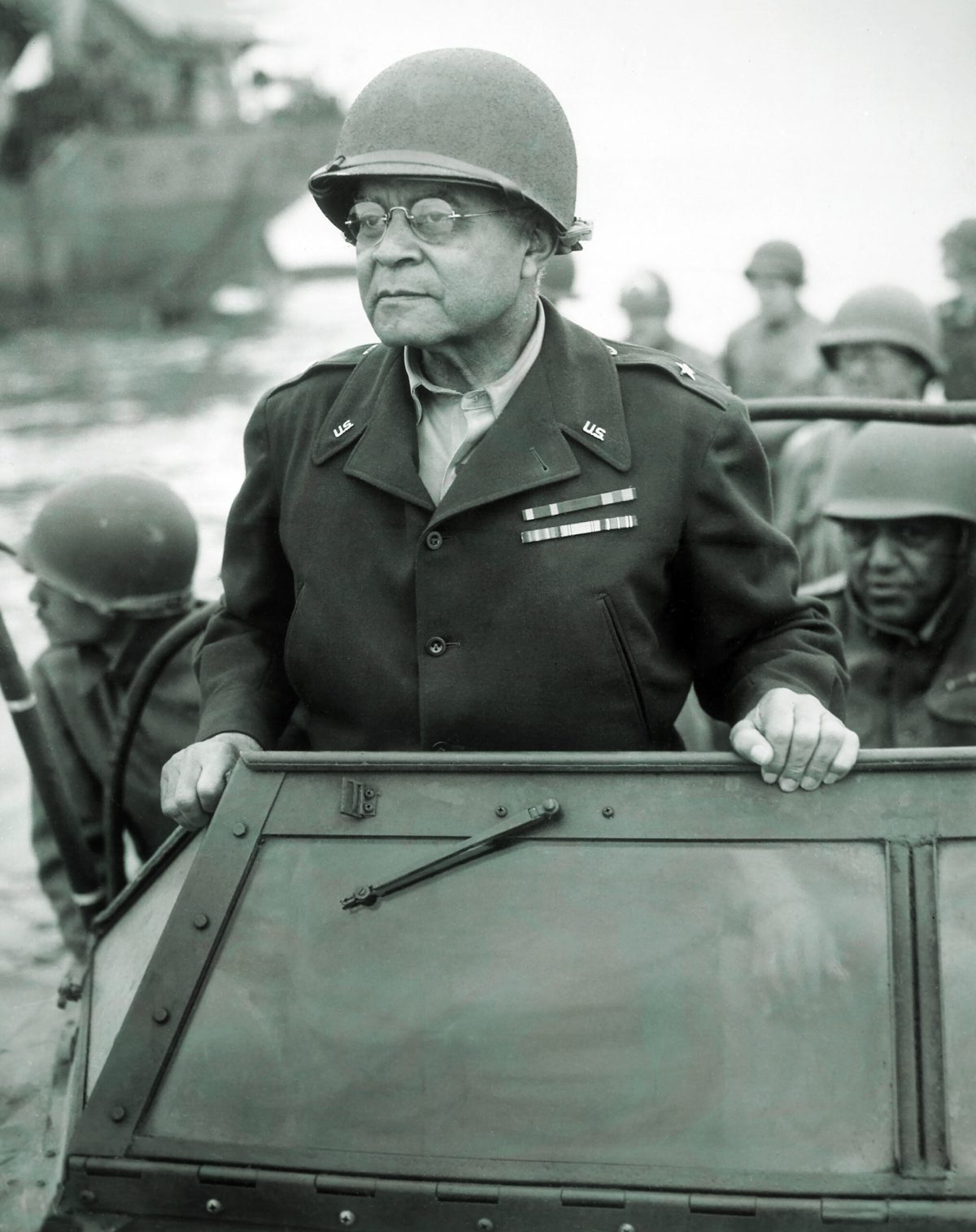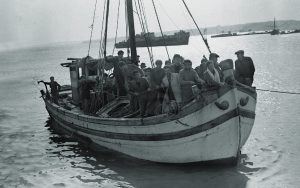Few families have exerted as much impact on black American history as Benjamin O. Davis and his son, Benjamin Jr. Their lives and careers were strikingly parallel. Both father and son fought a ceaseless, uncompromising battle for equality in the U.S. military by doing what all good officers are expected to do: set the example for their men.
Benjamin Oliver Davis Sr. was born to Louis and Henrietta Davis, a middle-class family in Washington, D.C., on May 28, 1880. Early in life he wanted to be a cavalry officer, but he faced strong opposition. Between 1865 and 1940, there were never more than three black officers at one time in the entire Army. For 39 years Davis would be one of them.
In 1898 Davis enlisted in the U.S. Army and tried to enter the Military Academy at West Point, N.Y. His application was rejected—President William McKinley’s staff explained that it was “not politically feasible” at that time. Undaunted, Davis worked his way up through the ranks, obtaining a second lieutenant’s commission in two years and a first lieutenant’s in six—a remarkable achievement for any enlisted soldier, black or white. After service in the Philippines, Davis returned to the United States, and in October 1902 he married Elnora Dickerson. She would bear him three children: Olive, Benjamin Jr. and Elnora.
Davis presented military authorities with a dilemma. Although he deserved advancement, prevailing segregation required that he not outrank white officers on the same base or command white soldiers. The Army’s solution was to devise a “shuttle system,” moving Davis to one “safe” quasi-military assignment after another. His first such posting was to Wilberforce, a black university in Ohio, where he served as a professor of military science and tactics. In a subsequent assignment to the Mexican border, he received an efficiency report that described him as “ordinary,” “too fat” and “lacks initiative and enthusiasm.” A review board negated that report and promoted him to captain. He returned to Wilberforce.
In 1916 Davis’ wife died. During World War I, he was shipped to the Philippines, where he courted a family friend, Sadie Overton, by mail for two years. In 1919 she traveled to Manila, and the two were married. Disappointed at being denied the opportunity to lead troops in combat, Davis was also incensed to read an article in the Army and Navy Journal alleging that blacks were not promoted because they were “deficient in moral fiber, rendering them unfit as officers and leaders of men.” In 1920 Davis was moved again to a professorship at the Tuskegee Institute as a lieutenant colonel. In November 1929, he was the only black officer in the U.S. military. Promoted to full colonel, he continued a humdrum career marked by frequent transfers throughout the 1930s. Then in 1940 he was given the unprecedented rank—for a black American—of brigadier general. Some said the promotion was politically motivated by President Franklin D. Roosevelt’s wish to woo the black vote. Possibly. But it was equally true that Davis had superb qualifications and the promotion was overdue.
Davis retired in 1948 after 50 years of Army service, but he remained active in the civil rights movement. Sadie died in 1966, and Benjamin followed her on Thanksgiving Day 1970. By then, his dreams were being upheld by his son.
Born on December 18, 1912, Benjamin O. Davis Jr. was encouraged to read and achieve high grades in school. “My father disciplined me,” he later recalled. “When mother Sadie prescribed a whipping, my father took off his belt and administered it.”
In 1929 the elder Davis began a campaign to gain his son admittance to West Point. While enrolled at the University of Chicago in 1931, the younger Davis received an appointment to the academy but failed the examinations. Given a second chance in 1932, he succeeded.
Three blacks had gone through the full curriculum at West Point since Henry O. Flipper graduated in 1877, but Davis still faced a difficult, lonely time at the academy, since, he recalled, “no white boy could be asked to room wtih me.” One day Davis overheard someone ask, “What are we going to do about the n——?” The solution was “silencing”—the cadets vowed never to speak to him, except on military business. In spite of that isolation, designed to force an unwelcome cadet into resigning, Davis persevered. At the same time, he applied to the U.S. Army Air Corps, only to be rejected. In 1936 Davis emerged from his ordeal 35th in a class of 276, West Point’s fourth black graduate and its first since 1889.
After graduation, Davis happily married Agatha Scott and unhappily accepted an assignment to the Infantry School at Fort Benning, Ga. Shortly thereafter, he was sent to Tuskegee, to serve as his father’s aide as a captain. His fortunes changed, however, when he was assigned to pilot training at Moten Field, Ala., which would later be renamed Tuskegee Army Air Field. Overruling the protests of Army Air Forces General Henry H. “Hap” Arnold that blacks would create “an impossible social situation,” the Army had initiated an experimental black flying program. Davis knew that he and every other black trainee would have to prove themselves if the concept were to take root in the military, and they conducted themselves accordingly.
One of the first Tuskegee Airmen to earn his pilot wings, Davis was given command of the 99th Fighter Squadron, and in May 1942 he advanced two ranks to lieutenant colonel. In April 1943, the 99th left for North Africa, where its pilots would fly Curtiss P-40s against veteran German airmen in superior Messerschmitt Me-109G and Focke Wulf Fw-190A fighters. Game as the black pilots were to take on the Luftwaffe in the air, for months the 99th was almost exclusively engaged in ground-attack missions, while the squadron was passed from one fighter group to another. On July 2, 1st Lt. Charles B. Hall drew first blood for the squadron in the air when he downed an Fw-190 over Tunisia.
In September 1943, Davis returned to the United States to take command of the all-black 332nd Fighter Group being formed at Selfridge Field, Mich. There, he was shown a letter from Colonel William Momyer, commander of one of the 99th Squadron’s least hospitable hosts, the 33rd Fighter Group, saying that the 99th had “demonstrated insufficient air discipline…its formations had disintegrated under fire.” Momyer concluded, “The Negro type has not the proper reflexes to make a first class fighter pilot,” and that the 99th and all succeeding black squadrons should be assigned to noncombat areas.
Davis defended the 99th’s performance, arguing that poor pilot training and the lack of sufficient combat flying had indeed caused the squadron to falter initially, but that his group was now performing on a level with white fliers. The Momyer report was dismissed.
Soon thereafter, Davis obtained more tangible evidence to hold up to the critics. On January 27, 1944, the 99th Fighter Squadron was credited with downing eight Fw-190s, and Captain Charles Hall downed two more the next day. It was a turning point for the entire Tuskegee program—proof that the experiment was working.

Davis found Selfridge Field rife with racial turbulence. One ugly incident almost led to murder. In direct violation of Army Regulations 210-10, black officers were not allowed in the officers’ club. On New Years’ Day 1944, three black officers tried to gain entrance but were refused by three senior white officers. One, Colonel Charles Gayle, announced, “I will court-martial for inciting to riot the first [black] man who steps into the officers’ club!”
Furious, the three black officers resolved to get rid of Gayle. They planned to follow him into the air, then, positioning one man at each wing and one over his cockpit, they would force him to crash into the ground. Fortunately, once Gayle was airborne the officers were unable to find him and, after reconsideration, discarded their plot. One of the conspirators, Daniel “Chappie” James Jr., would later become the U.S. Air Force’s first black four-star general.
Meanwhile, the 332nd Group shipped out to Italy in 1944, escorting bombers of the Fifteenth Air Force. Colonel Davis habitually led his squadrons, racking up 35 combat missions and earning the Silver Star. As the group’s squadrons—the 100th, 301st and 302nd, later joined by the 99th—gained experience and confidence, they scored 39 victories in July 1944. Davis regarded such achievements as of secondary importance, however, and kept strict control over which of his men could go after individual enemy fighters, to prevent them from being distracted from their primary mission of protecting the bombers. In late June 1944, the 332nd was fully equipped with first-class North American P-51 Mustang fighters, and soon gained fame as the “Red Tails” because of its adopted group marking. In September 1944, the 332nd Fighter Group was honored at an awards ceremony in which Brig. Gen. Benjamin O. Davis Sr. watched as Maj. Gen. Nathan Twining, commander of the Fifteenth Air Force, pinned the Distinguished Flying Cross on Colonel Benjamin O. Davis Jr.
By the time Germany surrendered on May 8, 1945, the 332nd Group had been credited with 116 victories and the extraordinary achievement of not losing a single bomber to enemy fighters. In June Colonel Davis returned to the States to command the 477th Composite Group. He then spent 10 months at the prestigious War College as its only black officer.
Davis was serving with the Directorate of Operations in the Pentagon when the Korean War broke out on June 25, 1950. Racial discrimination had officially been prohibited in the recently independent U.S. Air Force, and in 1953 Davis commanded the 51st Fighter Interceptor Wing in Korea. The next year he was promoted to brigadier general and assigned to Far Eastern Air Force headquarters in Japan, as director of operations and training. In 1955 he became vice commander of the Thirteenth Air Force, rising to the rank of major general.
Davis reached the pinnacle of his military career in 1965. Now a lieutenant general, he served as chief of staff for the United Nations Military Command in Korea. He retired from the service in January 1970 and, like his father, continued to champion civil rights until his death on July 4, 2002, at age 89.
As soldiers, citizens and freedom fighters, Benjamin Davis Sr. and Jr. are unique in American history. The father was the U.S. Army’s first black general, setting a precedent that his son, the U.S. Air Force’s first black general, would live up to and surpass.





